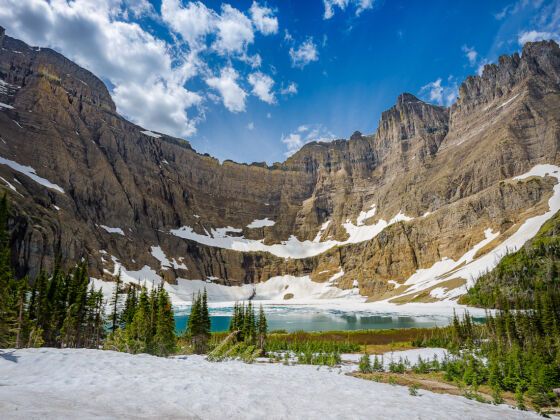I TOOK A BOAT ACROSS Lake MacDonald when I was ten years old. I had been in nearby Glacier Park many times during my childhood, but this was the first time I remembered the heat of the sun, the chill of the mountain water spraying up from the boat and misting me in the face, and the way you could see all the way to the bottom of the lake. Reflected in the water — some of the cleanest in the world — you could see the towering glaciers that gave the park its name, still blanketed in winter snow even in July.

When My Home Started Melting: Watching Glacier National Park Disappear
“Scientists predict,” an informative voice over the boat’s speaker system spoke. “That the glaciers will disappear in forty years — perhaps less.”
I looked to my parents. They sat holding my younger brother and pointing out a bald eagle overhead to my sister. “Is that right?” I asked my dad. “Are the glaciers going away?”
He smiled sadly. “I hope not, sweetie.”
The prediction is not right. Unfortunately, it’s likely to be much sooner. The National Park Service website states that scientists have recalculated a new date when the glaciers will be entirely gone — the year 2030. A park that once held more than 150 glaciers now holds a third of that, and it continues to become less and less each year.
I am now twenty-five and frequently away from the valley where I grew up, but every time I return home and look up into the pass where Glacier Park begins, I’m reminded of that day when I was ten and concerned about the fate of the place where I had so many memories. I had taken my first hikes strapped tightly in a backpack carried by my dad. I learned how to find deer tracks in the snow after pulling on a pair of small snowshoes at eight, and I marveled at the sight of the precarious Going-to-the-Sun road and the permanence of the glaciers crowning the mountaintops.
It’s not only just the park that’s suffering. When people tend to think of climate change, many see it as a morphing landscape, unaware that it affects humans just as much. The nearby Flathead Valley where I grew up relies heavily on the solid snowpack that make up the glaciers. Without snow, we do not have water for our large farms, usually green and thriving in May and June. Less snow means fewer skiers in the winter (or snow worth skiing on), which affects tourism. Forest fires are more likely and evacuation necessary. And perhaps most of all, a changing landscape means the fresh water we drink straight from the glaciers as a source is limited.
Animals and plants are also having to adapt to their new backyards. Species that can inhabit various areas will probably survive such as bears and moose, but it’s unclear how animals with decreasing populations will fare. We are already losing our wolverine population, a creature that relies heavily on snowpack to create dens and find food.
My father and I decided to hike the Highline Trail over my birthday last year. The Highline usually offers visitors a chance to touch the snow even in late summer. While there were a few berms where tourists had carved their names and that slowly trickled down the mountainside, it was far from the amount of snow I remember covering Logan Pass years ago when I was a child. Perhaps there is no place so immediate where you can see the effects of what we have done to our planet. As the glaciers start to disappear, we can track year by year how much the world has changed.
At twenty-five, touching the receding snow with my bare hand, I had the same feeling of horror in the pit of my stomach as I did when I was ten. I felt as though I had failed somehow. Failed the place that had shaped me so much like the glaciers had shaped the mountainsides. I wanted to turn to my father in the same way I had then and be reassured that we could fix it — but I know we can’t. It’s too late to alter this change we have made to our world.
What will Glacier Park, the “Crown of the Continent,” be without its sparkling jewels? What will its legacy be if it no longer holds its namesake? These are all questions we have no answers for yet. I can only be happy that my home continues to be evidence that the world is silently crying for help — and that those who love it can make a difference in the future.